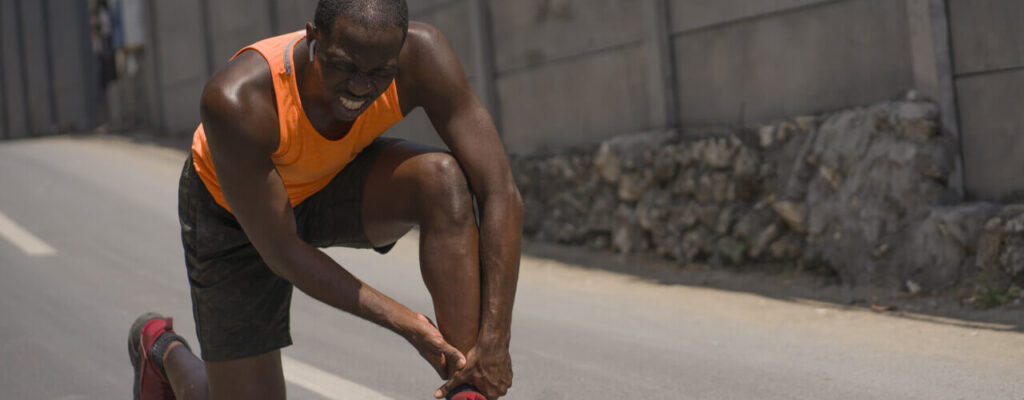Have You Sustained a Sprain or Strain to Your Ankle? Get Back on Your Feet with Physical Therapy

Ready to Move with Ease Once Again?
If you’re having ankle pain that isn’t going away, there’s a significant chance that you’ve suffered from a strain or a sprain! People sometimes use these two terms interchangeably, but there is actually a big distinction between them.
A strain is the tear or overstretching of a muscle or tendon. These tendons connect the bones to the muscles. Your lower back and hamstrings are the most popular area of strains. A sprain is the overstretching or tearing of a ligament. Ligaments are rows of tissue linking bones in a joint. Sprains commonly occur in the joint of your ankle but can happen in any joint.
The good news is that you no longer have to live in discomfort. Physical therapy will benefit you! To learn more about the natural and effective treatment of pain and prevention of sprains and strains through PT, please call our office today. One of our certified physical therapists will be pleased to see you!
Ankle injuries: a common area of pain
Although many injuries are more likely to occur as we age, according to WebMD, “Ankle injuries can happen to anyone at any age. However, men between 15 and 24 years old have higher rates of ankle sprain, compared to women older than age 30 who have higher rates than men. Half of all ankle sprains occur during an athletic activity. Every day in the U.S., 25,000 people sprain their ankle. And more than 1 million people visit emergency rooms each year because of ankle injuries.”
That’s a pretty impressive statistic, and it just goes to show that literally everyone is at risk for receiving an injury to their ankle! That’s why it’s incredibly important to be aware of how you’re moving your body in order to prevent one, as well as understanding your treatment options should you get hurt.
What can I expect from a treatment plan?
Active therapy in physical therapy includes targeted workouts and stretching. Passive treatment includes electrical stimulation, ultrasound, massage, and heat therapy. Electrical stimulation and heat therapy are very helpful in reducing ankle pain.
Physical therapy has also been shown to be an effective treatment for ligament sprains, such as ACL tear. ACL tears are a very common injury to the knee. Physical therapy has also been shown to be beneficial for damage to the Achilles tendon and other forms of sprains and strains. No matter what the injury might be, physical therapy is here to help.
How can a physical therapist help me find relief?
Many strains and sprains can be treated with a method called the RICE technique. RICE stands for Rest, Ice, Compression, and Elevation. A majority of folks can do this technique at home, but it doesn’t always work. If you find that your injury doesn’t heal this way, it’s time to see the doctor. A doctor will most likely conduct a few tests and take an X-ray to see if there are bone fractures. If not, the diagnosis is typically a strain or a sprain.
This is where physical therapy should come in! You might be recommended by your doctor to visit a physical therapist, no matter the cause or severity of the injury. Physical therapy will play a vital role in your rehabilitation, since physical therapists know a multitude of ways to effectively relieve and alleviate discomfort, such as the ones from ankle sprains and strains. They can also enhance your coordination and strength.
Why did I sustain a sprain or strain?
Symptoms for strains and sprains are very similar, which is another reason people seem to mix the two up! You might experience muscle spasms, swelling and inflammation, decreased range of motion, limited flexibility, and pain around the affected joint.
The biggest difference between the two is that a sprain will normally show up with bruising on the skin around that affected area.
Some ways that you can receive a strain or sprain are as follows:
- Prolonged repetitive motion
- Slipping and falling
- Athletic activities
- Overexerting yourself
- Lifting heavy objects
It’s important to warm up before physical activity to avoid receiving a sprain or strain. Make sure when you’re working out that you are alert and aware of your surroundings, and using the proper equipment as well so you don’t have an accident resulting in one of the two injuries.
There are also environmental factors that can put you at risk as well, such as slippery or icy surfaces, or exercising on rocky ground that could cause you to trip and fall.
Get moving again today!
If you have ankle pain from a strain or sprain, don’t let it get worse by putting off treatment any longer. Our office is here to help you out! Give us a call today to learn how we can get you on the road to recovery.
Our qualified and licensed physical therapists will carry out a thorough evaluation to determine your condition and develop an individualized treatment program. In no time we will help you recover and live your normal life again!



